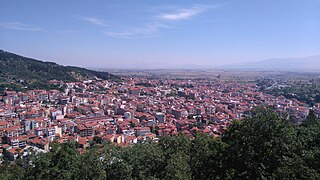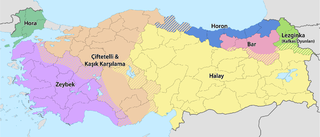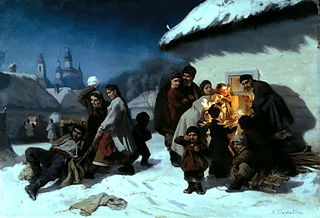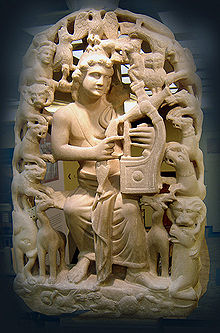
Florina is one of the regional units of Greece. It is part of the region of West Macedonia. Its capital is the town of Florina.

Music of Thrace is the music of Thrace, a region in Southeastern Europe spread over southern Bulgaria, northeastern Greece, and European Turkey.

Florina is a town and municipality in the mountainous northwestern Macedonia, Greece. Its motto is, 'Where Greece begins'.

Karsilamas, is a folk dance spread all over Northwest Turkey and carried to Greece by Greek refugees. The term "karşılama" means "encounter, welcoming, greeting". The dance is popular on Northwestern areas of Turkey, especially on wedding parties and festivals.

Vevi is a village located in the municipal unit of Meliti in Florina regional unit, Macedonia, Greece. The village is passed by two national roads which lead to Thessaloniki, Florina, Amyntaio, and Kozani. Additionally, it has a railway station on the line between Florina and Thessaloniki.

Paroreio is a small village located about 15 kilometres north of Florina, the capital of the regional unit of Florina in northwestern Greece. Today, Paroreio is inhabited by only a small number of full-time residents. At its peak in the 1930s, the village reached about 600-700 inhabitants, mostly families looking for a piece of fertile land to cultivate and farm in the nearby valley.

Leventikos, also known as Litós (Λιτός), Kucano, Nešo, and Bufskoto Oro, is a dance of western Macedonia, mainly performed by ethnic Macedonians and Greeks in the town of Florina, Greece and in the Resen and Bitola regions in the neighbouring Republic of Macedonia.
Paidushko horo is a folk dance from Bulgaria, Greece and Macedonia. It features a 5-beat meter divided into "quick" (2-beat) and "slow" (3-beat) units, abbreviated quick-slow or 2-3. In Bulgaria it is part of the "Northern folklore region" time 5-8 (help·info). Like many other Balkan folk dances, each region or village has its own version of the dance. It is traditionally a men's dance, but in modern times it is often performed in lines of both men and women.

Macedonia is a geographic and former administrative region of Greece, in the southern Balkans. Macedonia is the largest and second-most-populous Greek region, with a population of 2.38 million in 2017. The region is highly mountainous, with most major urban centres such as Thessaloniki and Kavala being concentrated on its southern coastline. Together with Thrace, and sometimes also Thessaly and Epirus, it is part of Northern Greece. Greek Macedonia encompasses entirely the southern part of the region of Macedonia, making up 51% of the total area of the region. It also contains Mount Athos, an autonomous monastic region of Greece. Macedonia forms part of Greece's national frontier with three countries: Bulgaria to the north-east, the Republic of North Macedonia to the north, and Albania to the north-west.

Greek dances (horos) is a very new tradition, being referred to by authors such as Plato, Aristotle, Plutarch and Lucian. There are different styles and interpretations from all of the islands and surrounding mainland areas. Each region formed its own choreography and style to fit in with their own ways. For example, island dances have more of a different smooth flow to them, while Pontic dancing closer to Black Sea, is very sharp. There are over 10,000 traditional dances that come from all regions of Greece. There are also pan-Hellenic dances, which have been adopted throughout the Greek world. These include the syrtos, kalamatianos, pyrrhichios, hasapiko and sirtaki.
Ohrana ; were armed collaborationist detachments organized by the former Internal Macedonian Revolutionary Organization (IMRO) structures, composed of Bulgarians in Nazi-occupied Greek Macedonia during World War II and led by officers of the Bulgarian Army. Bulgaria was interested in acquiring Thessalonica and Western Macedonia, under Italian and German occupation and hoped to sway the allegiance of the 80,000 Slavs who lived there at the time. The appearance of Greek partisans in those areas persuaded the Axis to allow the formation of these collaborationst detachments. However, during late 1944, when the Axis appeared to be losing the war, many Slavophone Nazi collaborators, Ohrana members and VMRO regiment volunteers fled to the opposite camp by joining the newly founded communist SNOF. The organization managed to recruit initially 1,000 up to 3,000 armed men from the Slavophone community that lived in the western part of Greek Macedonia.

Kratero is a village located in the Florina regional unit of northwestern Macedonia, Greece.
Slavic-speakers are a linguistic minority population in the northern Greek region of Macedonia, who are mostly concentrated in certain parts of the peripheries of West and Central Macedonia, adjacent to the territory of the Republic of Macedonia. The language called "Slavic" in the context of Greece is generally called "Macedonian" or "Macedonian Slavic" otherwise. Some members have formed their own emigrant communities in neighbouring countries, as well as further abroad.
Bufčansko or Bufsko meaning a dance from the village of Buf is a Macedonian folk dance (oro) from the region of Bitola and Lerin (Florina).
Pavlos Voskopoulos or Pavle Voskopulos is a Greek politician, a member of the collective leadership of the Rainbow party that represents the Macedonian-speaking minority in Aegean Macedonia.
Zaramo is a popular shoulder-hold dance in the Republic of Macedonia and also in Macedonia (Greece), in the region around Florina.

Flampouro is a village in the central part of Florina regional unit, northern Greece, part of the Perasma municipal unit. The original indigenous name for the village of Flambouro is Negovani and means "cold water" The village's year round population is estimated at 500 people, but in the summer it grows to nearly 700. In the surrounding area many other villages can be found, including Aetos, Skopia, Kato Ydroussa, and Ano Ydroussa.

Lofoi is a village in the Florina peripheral unit, Greece, located 15 km east of the city of Florina. Its name in Bulgarian is Забърдени, and in Macedonian Slavic is Заб'рдени (Zab'rdeni). It was also known as Ζαπύρδανη (Zapyrdani) or Ζαμπύρδανη (Zampyrdani) in Greek, until it was renamed by Greek authorities in 1926.

Koliada or koleda is an ancient pre-Christian Slavic winter festival. It was later incorporated into Christmas.

Poustseno Macedonian "Пуштено", Pushteno, meaning "set free" is a traditional Greek dance from Macedonia, Greece. It is danced in the area of Florina by the local Macedonians, as well as others, and is also known with the Greek name of "Lytos".










